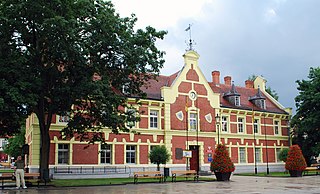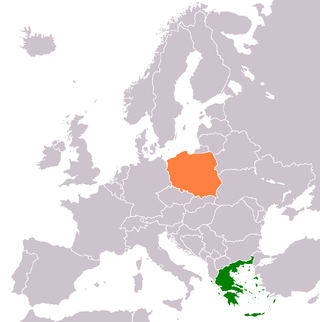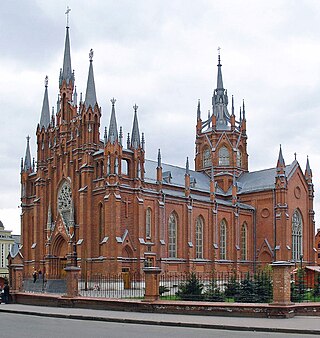
Starogard Gdański is a city in Pomeranian Voivodeship in northern Poland with 48,328 inhabitants (2004).
The Polish minority in the Soviet Union are Polish diaspora who used to reside near or within the borders of the Soviet Union before its dissolution. Some of them continued to live in the post-Soviet states, most notably in Lithuania, Belarus, and Ukraine, the areas historically associated with the Polish–Lithuanian Commonwealth, as well as in Kazakhstan and Azerbaijan among others.

According to the 2021 Romanian census, 2,137 Poles live in Romania, mainly in the villages of Suceava County. There are three exclusively Polish villages, as follows: Nowy Sołoniec, Plesza (Pleșa), and Pojana Mikuli, as well a significant Polish presence in Kaczyca (Cacica) and Paltynosa (Păltinoasa). There is also a relatively sizable number of ethnic Poles living in the county seat, Suceava.

The Polish diaspora comprises Poles and people of Polish heritage or origin who live outside Poland. The Polish diaspora is also known in modern Polish as Polonia, the name for Poland in Latin and many Romance languages.

The Polish minority in the Czech Republic is a Polish national minority living mainly in the Trans-Olza region of western Cieszyn Silesia. The Polish community is the only national minority in the Czech Republic that is linked to a specific geographical area. Trans-Olza is located in the north-eastern part of the country. It comprises Karviná District and the eastern part of Frýdek-Místek District. Many Poles living in other regions of the Czech Republic have roots in Trans-Olza as well.

Greek-Polish relations are relations between Greece and Poland. Both countries are full members of NATO, the European Union, Three Seas Initiative, OECD, OSCE, the Council of Europe and the World Trade Organization. There are circa 4,000 people of Greek descent living in Poland, and over 20,000 people of Polish descent living in Greece. Greece has given full support to Poland's membership in the European Union and NATO.

There are currently more than 47,000 ethnic Poles living in the Russian Federation. This includes native Poles as well as those forcibly deported during and after World War II. When including all of the countries of the former Soviet Union, the total number of Poles is estimated at up to 3 million.

Polish–Bulgarian relations are foreign relations between Poland and Bulgaria. Both countries are full members of the European Union, NATO, Bucharest Nine, Three Seas Initiative, OSCE, Council of Europe and World Trade Organization.

Polish–Romanian relations are foreign relations between Poland and Romania.

Around 6 million Polish citizens perished during World War II: about one fifth of the entire pre-war population of Poland. Most of them were civilian victims of the war crimes and the crimes against humanity which Nazi Germany and the Soviet Union committed during their occupation of Poland. Approximately half of them were Polish Jews who were killed in The Holocaust. Statistics for Polish casualties during World War II are divergent and contradictory. This article provides a summary of the estimates of Poland's human losses in the war as well as a summary of the causes of them.
Polish settlement in the Philippines began during the Spanish colonial period, mostly with the arrival of Catholic clergy destined for missionary work in other Asian countries. As of 2010 the 2010 census, there are 93 persons in the Philippines who claim Polish citizenship, and the Polish community in the Philippines is the fourth-largest Central European community in the country, after the local communities of Germans, Hungarians and Albanians.

Poles in Hungary form a population of 7,001, according to the 2011 census, and Polish presence in Hungary dates back to the Middle Ages.

Polish Colombians are Colombian citizens of full or partial Polish ancestry, or Polish-born person residing in Colombia. Most of the Polish immigrants that fled from the Holocaust to Colombia were Polish Jews.

Karol Aleksander Boromeusz Hoffman was a Polish political writer, historian, lawyer and publisher.

Poland–Yugoslavia relations were historical foreign relations between Poland and now broken up Yugoslavia.

Poles in Uzbekistan form a small population, although historically the second most numerous Polish diaspora of Central Asia. Polish presence in Uzbekistan dates back to the 19th century.

Poles in China form a small population, estimated at 1,000 and mostly concentrated in the major cities of Beijing, Guangzhou, Hong Kong and Shanghai. First noted Polish people lived in China in the 17th century.
Poles in Tajikistan form a small population, part of the Polish diaspora in Central Asia.

Poles in Japan form a small population of 1,510, yet the largest Polish diaspora in East Asia.

Belgium–Poland relations are the bilateral relations between Belgium and Poland. Official relations were established in 1919, although contacts date back over 1000 years, with frequent migrations in both directions, substantial cultural exchange, extensive trade, and, in the modern era, mutual assistance in times of need. Both nations are members of NATO, the European Union, OECD, OSCE and the Council of Europe.


















